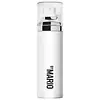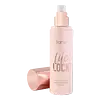What's inside
What's inside
 Key Ingredients
Key Ingredients

 Benefits
Benefits

 Concerns
Concerns

 Ingredients Side-by-side
Ingredients Side-by-side

Water
Skin ConditioningPvp
Emulsion StabilisingPhenoxyethanol
Preservative1,2-Hexanediol
Skin ConditioningNiacinamide
SmoothingButylene Glycol
Humectant3-O-Ethyl Ascorbic Acid
Skin ConditioningSodium Citrate
BufferingEthylhexylglycerin
Skin ConditioningCitric Acid
BufferingCaffeine
Skin ConditioningGlycerin
HumectantHyaluronic Acid
HumectantSodium Lauroyl Lactylate
EmulsifyingHydroxypropyltrimonium Hyaluronate
Hippophae Rhamnoides Extract
MaskingCeramide NP
Skin ConditioningCeramide AP
Skin ConditioningPhytosphingosine
Skin ConditioningAlteromonas Ferment Extract
Skin ConditioningCholesterol
EmollientXanthan Gum
EmulsifyingCarbomer
Emulsion StabilisingVaccinium Corymbosum Fruit Extract
Skin ConditioningEuterpe Oleracea Fruit Extract
Ceramide EOP
Skin ConditioningWater, Pvp, Phenoxyethanol, 1,2-Hexanediol, Niacinamide, Butylene Glycol, 3-O-Ethyl Ascorbic Acid, Sodium Citrate, Ethylhexylglycerin, Citric Acid, Caffeine, Glycerin, Hyaluronic Acid, Sodium Lauroyl Lactylate, Hydroxypropyltrimonium Hyaluronate, Hippophae Rhamnoides Extract, Ceramide NP, Ceramide AP, Phytosphingosine, Alteromonas Ferment Extract, Cholesterol, Xanthan Gum, Carbomer, Vaccinium Corymbosum Fruit Extract, Euterpe Oleracea Fruit Extract, Ceramide EOP
Water
Skin ConditioningAmp-Acrylates/Allyl Methacrylate Copolymer
Pvp
Emulsion StabilisingKaolin
AbrasivePassiflora Edulis Seed Oil
EmollientVitis Vinifera Seed Oil
EmollientCitrullus Lanatus Fruit Extract
Skin ConditioningCitrus Limon Fruit Extract
MaskingEuterpe Oleracea Fruit Extract
Fragaria Vesca Fruit Extract
AstringentLycium Barbarum Fruit Extract
AstringentMalpighia Punicifolia Fruit Extract
AntioxidantPassiflora Incarnata Fruit Extract
Skin ConditioningPrunus Persica Fruit Extract
AbrasivePunica Granatum Fruit Extract
AntioxidantVaccinium Angustifolium Fruit Extract
Skin ProtectingVaccinium Macrocarpon Fruit Extract
AstringentSodium Hyaluronate
HumectantHydrolyzed Vegetable Protein
Skin ConditioningLeuconostoc/Radish Root Ferment Filtrate
AntimicrobialDiamond Powder
AbrasiveTocopheryl Acetate
AntioxidantNiacinamide
SmoothingBakuchiol
AntimicrobialCaffeine
Skin ConditioningAloe Barbadensis Leaf Juice
Skin ConditioningHyaluronic Acid
HumectantRubus Chamaemorus Fruit Extract
AntioxidantPanthenol
Skin ConditioningPhenoxyethanol
PreservativeEthylhexylglycerin
Skin ConditioningPolysorbate 20
EmulsifyingPentylene Glycol
Skin ConditioningPropanediol
SolventGlycerin
HumectantCitric Acid
BufferingPotassium Sorbate
PreservativeSodium Benzoate
MaskingTocopherol
AntioxidantWater, Amp-Acrylates/Allyl Methacrylate Copolymer, Pvp, Kaolin, Passiflora Edulis Seed Oil, Vitis Vinifera Seed Oil, Citrullus Lanatus Fruit Extract, Citrus Limon Fruit Extract, Euterpe Oleracea Fruit Extract, Fragaria Vesca Fruit Extract, Lycium Barbarum Fruit Extract, Malpighia Punicifolia Fruit Extract, Passiflora Incarnata Fruit Extract, Prunus Persica Fruit Extract, Punica Granatum Fruit Extract, Vaccinium Angustifolium Fruit Extract, Vaccinium Macrocarpon Fruit Extract, Sodium Hyaluronate, Hydrolyzed Vegetable Protein, Leuconostoc/Radish Root Ferment Filtrate, Diamond Powder, Tocopheryl Acetate, Niacinamide, Bakuchiol, Caffeine, Aloe Barbadensis Leaf Juice, Hyaluronic Acid, Rubus Chamaemorus Fruit Extract, Panthenol, Phenoxyethanol, Ethylhexylglycerin, Polysorbate 20, Pentylene Glycol, Propanediol, Glycerin, Citric Acid, Potassium Sorbate, Sodium Benzoate, Tocopherol
Ingredients Explained
These ingredients are found in both products.
Ingredients higher up in an ingredient list are typically present in a larger amount.
Caffeine is most associated with coffee, tea, and cacao. In skincare, it helps with calming inflammation and is rich in antioxidants.
While caffeine is used to treat cellulite and and dark circles, further studies are needed to prove this. It has been believed to help with these skin conditions due to its ability to dilate blood vessels and increase blood flow.
Some studies are looking into caffeine's ability to protect against UV rays.
Learn more about CaffeineCitric Acid is an alpha hydroxy acid (AHA) naturally found in citrus fruits like oranges, lemons, and limes.
Like other AHAs, citric acid can exfoliate skin by breaking down the bonds that hold dead skin cells together. This helps reveal smoother and brighter skin underneath.
However, this exfoliating effect only happens at high concentrations (20%) which can be hard to find in cosmetic products.
Due to this, citric acid is usually included in small amounts as a pH adjuster. This helps keep products slightly more acidic and compatible with skin's natural pH.
In skincare formulas, citric acid can:
While it can provide some skin benefits, research shows lactic acid and glycolic acid are generally more effective and less irritating exfoliants.
Most citric acid used in skincare today is made by fermenting sugars (usually from molasses). This synthetic version is identical to the natural citrus form but easier to stabilize and use in formulations.
Read more about some other popular AHA's here:
Learn more about Citric AcidEthylhexylglycerin (we can't pronounce this either) is commonly used as a preservative and skin softener. It is derived from glyceryl.
You might see Ethylhexylglycerin often paired with other preservatives such as phenoxyethanol. Ethylhexylglycerin has been found to increase the effectiveness of these other preservatives.
This extract comes from the Cabbage Palm, AKA the Açaí berry! It has skin soothing, antioxidant, and anti-aging properties.
Acai berries are rich in antioxidants, including ferulic acid (The famous vitamin C stabilizer). Antioxidants protect your skin against damaging free-radical molecules.
You can also find carbohydrates, lipids, proteins, minerals, vitamin A, and Vitamin C in these berries.
Learn more about Euterpe Oleracea Fruit ExtractGlycerin is already naturally found in your skin. It helps moisturize and protect your skin.
A study from 2016 found glycerin to be more effective as a humectant than AHAs and hyaluronic acid.
As a humectant, it helps the skin stay hydrated by pulling moisture to your skin. The low molecular weight of glycerin allows it to pull moisture into the deeper layers of your skin.
Hydrated skin improves your skin barrier; Your skin barrier helps protect against irritants and bacteria.
Glycerin has also been found to have antimicrobial and antiviral properties. Due to these properties, glycerin is often used in wound and burn treatments.
In cosmetics, glycerin is usually derived from plants such as soybean or palm. However, it can also be sourced from animals, such as tallow or animal fat.
This ingredient is organic, colorless, odorless, and non-toxic.
Glycerin is the name for this ingredient in American English. British English uses Glycerol/Glycerine.
Learn more about GlycerinHyaluronic acid is naturally found in healthy skin. It is a humectant, meaning it draws moisture to your skin.
This ingredient helps hydrate, soothe, and protect the skin.
What makes hyaluronic acid so hydrating? It has the capacity to bind or hold large amounts of water.
Fun fact: It is already naturally found in our bodies, such as the fluids of our eyes and our joints.
Studies find this ingredient to have anti-inflammatory and anti-microbial properties. This can help speed up wound-healing.
Hyaluronic acid can be irritating if the molecule has a low-molecular weight, or if the molecules are small.
One study found low-molecular weight hyaluronic acid to be pro-inflammatory, meaning some people may experience irritation. This is because our bodies use hyaluronic acid in the wound-healing process to signal to our bodies, via irritation, that something needs healing.
The same study found high-molecular weight hyaluronic acid to be anti-inflammatory.
These are some other common types of Hyaluronic Acid:
Learn more about Hyaluronic AcidNiacinamide is a multitasking form of vitamin B3 that strengthens the skin barrier, reduces pores and dark spots, regulates oil, and improves signs of aging.
And the best part? It's gentle and well-tolerated by most skin types, including sensitive and reactive skin.
You might have heard of "niacin flush", or the reddening of skin that causes itchiness. Niacinamide has not been found to cause this.
In very rare cases, some individuals may not be able to tolerate niacinamide at all or experience an allergic reaction to it.
If you are experiencing flaking, irritation, and dryness with this ingredient, be sure to double check all your products as this ingredient can be found in all categories of skincare.
When incorporating niacinamide into your routine, look out for concentration amounts. Typically, 5% niacinamide provides benefits such as fading dark spots. However, if you have sensitive skin, it is better to begin with a smaller concentration.
When you apply niacinamide to your skin, your body converts it into nicotinamide adenine dinucleotide (NAD). NAD is an essential coenzyme that is already found in your cells as "fuel" and powers countless biological processes.
In your skin, NAD helps repair cell damage, produce new healthy cells, support collagen production, strengthen the skin barrier, and fight environmental stressors (like UV and pollution).
Our natural NAD levels start to decline with age, leading to slower skin repair, visible aging, and a weaker skin barrier. By providing your skin niacinamide, you're recharging your skin's NAD levels. This leads to stronger, healthier, and younger looking skin.
Another name for vitamin B3 is nicotinamide. This vitamin is water-soluble and our bodies don't store it. We obtain Vitamin B3 from either food or skincare. Meat, fish, wheat, yeast, and leafy greens contain vitamin B3.
The type of niacinamide used in skincare is synthetically created.
Learn more about NiacinamidePhenoxyethanol is a preservative that has germicide, antimicrobial, and aromatic properties. Studies show that phenoxyethanol can prevent microbial growth. By itself, it has a scent that is similar to that of a rose.
It's often used in formulations along with Caprylyl Glycol to preserve the shelf life of products.
Pvp is a water-soluble synthetic polymer and common hairstyling ingredient. It is a film-forming ingredient and used to "hold" specific shapes of hair.
Pvp is less effective in high-humidity. It tends to draw moisture, but this moisture dismantles the structure and "hold".
Water. It's the most common cosmetic ingredient of all. You'll usually see it at the top of ingredient lists, meaning that it makes up the largest part of the product.
So why is it so popular? Water most often acts as a solvent - this means that it helps dissolve other ingredients into the formulation.
You'll also recognize water as that liquid we all need to stay alive. If you see this, drink a glass of water. Stay hydrated!
Learn more about Water